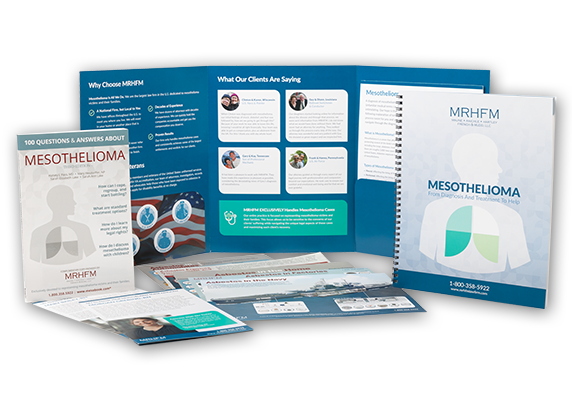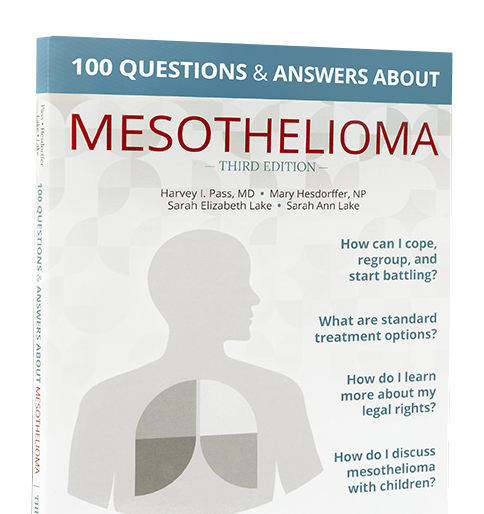Pleural mesothelioma is the most common form of mesothelioma, accounting for approximately 75% of all mesothelioma cases. While this is a rare and aggressive form of cancer, early detection may improve prognosis and provide greater treatment options. There is no cure for mesothelioma; however, ongoing research and clinical trials are producing more effective treatments that offer relief and may prolong the lives of mesothelioma patients.
Mesothelioma is a type of cancer that develops in the tissue surrounding the lungs, the stomach, the testes, or the heart. This tissue is called the mesothelium. Pleural mesothelioma occurs in the thin lining that protects the lungs, called the pleura.
There are two layers of the pleura: The outer layer, the parietal pleura, is attached to the chest wall; the inner layer, the visceral pleura, covers the lungs and connecting structures. Fluid between the two layers provides lubrication and aids movement of the lungs during breathing.
As in other types of cancer, mesothelioma occurs when cells become abnormal and grow out of control. In the case of pleural mesothelioma, tumors develop in the tissue surrounding the lungs, and excess fluid may accumulate in the pleural space, preventing the lungs from moving easily and expanding naturally. In advanced cases of mesothelioma, cells metastasize, or grow and spread to other areas of the body.
What Causes Pleural Mesothelioma?
Exposure to asbestos is the primary cause of pleural mesothelioma. Most patients diagnosed with mesothelioma worked in the manufacturing of products that contain asbestos, or used these products in their occupation. In some cases, family members of those who were exposed to asbestos in their work have developed mesothelioma. This may have resulted from asbestos dust being brought into the home on the workers' clothing.
Asbestos is a group of minerals that occur in rock and soil. Due to its qualities of heat resistance and fiber strength, asbestos has been used extensively in construction materials such as insulation, roofing shingles, cement and flooring products. It can also be found in brake and clutch linings, heat-resistant fabrics, gaskets and coatings.
Pleural mesothelioma results from breathing microscopic asbestos fibers into the lungs. Once the fibers enter the body, they become lodged in the lungs, and the body is unable to eliminate them. Over as many as 10 to 60 years, the irritation from these fibers can cause the buildup of scar tissue (asbestosis) and, in some cases, the development of cancer, including mesothelioma.
Symptoms of Pleural Mesothelioma
Pleural mesothelioma symptoms are typically subtle in the beginning stages of the disease's development and can be mistaken for common respiratory conditions or other ailments. More severe symptoms may not appear until cancerous tumors have developed on the lining of the lungs. When this happens, pressure on the lungs caused by this buildup leads to pain and shortness of breath, two of the most common symptoms of pleural mesothelioma. Other symptoms of pleural mesothelioma can include a persistent cough, coughing up blood, difficulty swallowing, fatigue and weight loss.
Diagnosing Pleural Mesothelioma
If you or a loved one has symptoms you are concerned about and has experienced exposure to asbestos, your doctor may perform tests to determine whether these symptoms are due to mesothelioma. These tests often include x-rays, CT (computed tomography) scan, PET (positron emission tomography) scan, and fluid and tissue samples.
Pleural Mesothelioma Treatment Options
Pleural mesothelioma treatment depends upon the disease stage; the patient's age, history and health at the time of diagnosis; and other factors. The most common types of treatment for pleural mesothelioma are chemotherapy, surgery and radiation therapy. Often, two or more of these treatments may be used together. Removal of fluid buildup in the chest may also be performed to alleviate pain and other symptoms. Some patients also benefit from alternatives treatments, such as gene therapy, photodynamic therapy, or visual or guided imagery.
To learn more about pleural mesothelioma, call toll free 800.259.8934 or CLICK HERE to receive a free book written by medical professionals who have treated mesothelioma.



